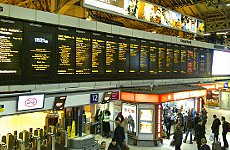Train fares are set to rise by up to 9.1% at the start of 2014, it was revealed today, as passengers are forced by the government to pay for investment into the railways.
Popular on LondonNet
“Running the railways is a hugely expensive business,” said Transport Secretary Patrick McLoughlin,
“What we’re doing is driving up the levels of investment… and I’m afraid the passenger has to make his contribution.”
The government sets fare rises according to an inflation-plus-1% formula, taken from the inflation figure for each August. With inflation currently running at 3.1%, average fares will go up by 4.1% in January next year, about double the predicted rise in average wages.
That’s the average, but train companies are within their rights to whack up selected fares by 5% more than inflation, so long as they lower others by the same amount.
Unsurprisingly, the fares they like to increase are often on the more popular routes into London. That means some fares will rise by 9.1%.
“Passenger and public subsidies are lining the pockets of the shareholders of private rail companies,” said Frances O’Grady, leader of the TUC, which set up demonstrations against the rises today in 50 stations, including Paddington and Victoria.
The Campaign for Better Transport put the case that above inflation fare rises are likely to harm the economy.
“Getting to work is now the biggest single monthly outgoing for many commuters; more than food, more than housing,” said the CBT’s Stephen Joseph.
“One of the surest ways of stamping on any green shoots of recovery is to price people off the trains and out of the jobs market. For the sake of the economy, we should end above-inflation fare increases now and start planning for fare reductions.”








